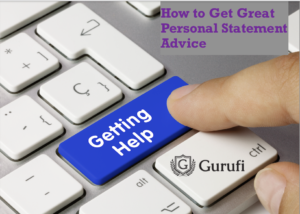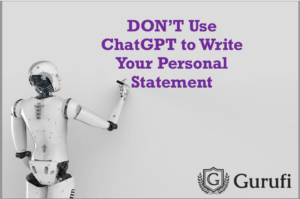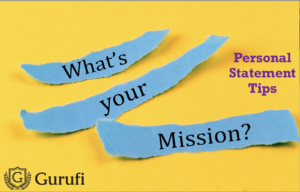
In the competitive world of applications—whether for college, graduate school, or a new job—a strong letter of recommendation can be a deciding factor in your favor. At Gurufi, where we specialize in personal statements, CVs, and letters of recommendation, we have seen firsthand how a well-crafted letter can make a substantial difference. Despite the fact that they play a pivotal role, far too many people simple hand them off to letter-writers and don’t have a thoughtful plan to ensure they get the most of their letters. Here is a 10-part guide to writing a strong letter of recommendation.
recommendation.
- Ask for a STRONG Letter of Recommendation
When I worked as a professor, I would write a letter for anybody who asked… but not everybody got a strong letter. If you earned a B-, my letter would basically say, “Johnny was in my class, completed the assignments on time, and earned a passing grade.” I told people beforehand, “I’ll write you a letter because it’s part of my job, but you haven’t earned a strong one.” By contrast, a great student got a longer, more specific and detailed, and effective letter.
What’s the lesson here? Don’t just ask if somebody will write you a letter; ask if they’ll write you a STRONG letter. They may say “no,” or otherwise, hedge, which indicates that you need to find somebody else. And, if they were going to write you a strong letter beforehand, it helps to set the expectation that you are seeking a letter that highlights your strengths and capabilities in a compelling way.
- Provide Your Personal Statement and CV
The best letters of recommendation are details, specific, and align with the core themes of your application. As such, to write a strong and detailed letter, your recommender needs to know about your achievements, goals, and experiences. Providing them with your personal statement and CV offers a comprehensive view of your background. Your personal statement will give them insights into your motivations and aspirations, while your CV will highlight your accomplishments and relevant experiences. This information helps them write a letter that is specific and tailored to the opportunity you are seeking.
When I wrote letters, having these documents was quite helpful in terms of making sure that I included details that complemented their application.
- Offer to Meet with Them to Discuss Your Application
A face-to-face or virtual meeting can be incredibly valuable. During this meeting, you can discuss the specific points you would like them to mention in the letter. Share your goals, why you’re applying for this particular program or position, and any specific achievements you want to highlight. This conversation can also help you gauge their willingness and enthusiasm for writing the letter, and it provides an opportunity for them to ask questions to better understand how they can support your application.
- Be Judicious About Who You Are Asking
Choosing the right person to write your letter of recommendation is crucial. Ideally, your recommender should know you well and be familiar with your work. This is FAR MORE important than simply choosing a big name. They should be someone who has observed your skills, achievements, and character firsthand and can write extensively about them. A letter from a well-known person may carry weight, but only if they truly know you and can provide a detailed and personal account of your abilities. Academic advisors, professors, direct supervisors, or mentors who have worked closely with you are often the best choices.
- Provide Them with Plenty of Time
Respect your recommender’s time by asking them well in advance of your application deadline. A rushed letter may lack the detail and thoughtfulness of one that was written with ample time. Asking somebody at the last minute might, frankly, also really annoy them, and “annoyed” isn’t the state of mind you want your writer to have. Aim to ask at least a month before the deadline, and be clear about when you need the letter. This allows your recommender to plan their schedule and gives them the time to craft a well-considered letter.
- Follow Up Politely and Be Sure to Thank Them Afterward
Once your recommender has submitted the letter, express your gratitude. A hand-written thank-you note is a courteous way to acknowledge their effort and support. Let them know how much you appreciate their help and keep them informed about the outcome of your application. A sincere thank you not only shows your appreciation but also leaves a positive impression for any future requests you may have.
If the deadline is approaching and you haven’t received confirmation that the letter has been submitted, it is appropriate to follow up politely. A gentle reminder can ensure that your application is completed on time without causing undue stress to your recommender.
Lastly, if you earn admission or get the job, be sure to forward that information to your letter-writer and thank them for it again.
- Provide Context and Details
If there are specific experiences or projects you want your recommender to mention, provide them with details. For example, if you worked on a significant project under their supervision, remind them of the specifics and the impact of your work. This helps them include concrete examples that can strengthen your letter.
I always appreciated it when students said, “please emphasize my work on X, Y, or Z…” as it gave me clarity about what to include.
- Stay Organized
Keep track of who you asked, when you asked, and the deadlines for each letter. This organization ensures you don’t miss any important dates and allows you to follow up as needed without appearing disorganized or forgetful.
- Offer to Write a Draft
In some cases, your recommender might appreciate a draft letter that they can edit and personalize. This can save them time and ensure that the key points you want to be included are covered. However, this should be offered tactfully and only if you believe it will be helpful.
Letter writing is highly individualized, and different people will ask you for different things. Remember that you’re the one asking for a favor, so do whatever you can -within ethical boundaries- to help them help you.
- Understand the Format and Requirements
Different institutions may have specific requirements for letters of recommendation. Make sure your recommender is aware of these requirements, whether it’s a particular format, length, or topics that need to be covered. Providing this information upfront can help them write a letter that meets all necessary criteria.
This is especially important if letters have to be uploaded to particular portals. Make sure that you provide clear instructions and perhaps even offer to set it up for them if they haven’t already.
Conclusion
Securing a strong letter of recommendation requires careful planning, clear communication, and consideration for your recommender’s time and effort. By following these steps, you can ensure that your letters of recommendation are compelling, detailed, and tailored to support your application. At Gurufi, we’re here to help you through every step of the process, ensuring that your application stands out for all the right reasons. Good luck!
For more help with your personal statement, check us out at Gurufi.com. Our personal statement editors and consultants have decades of experience helping clients get into top Masters and Ph.D. programs in STEM, humanities, fine arts, and social sciences. Our specialty is helping you craft compelling personal statements that move the needle in your admissions process! For questions, shoot us an email at service@gurufi.com. Check us out on Facebook, Twitter, and LinkedIn.








